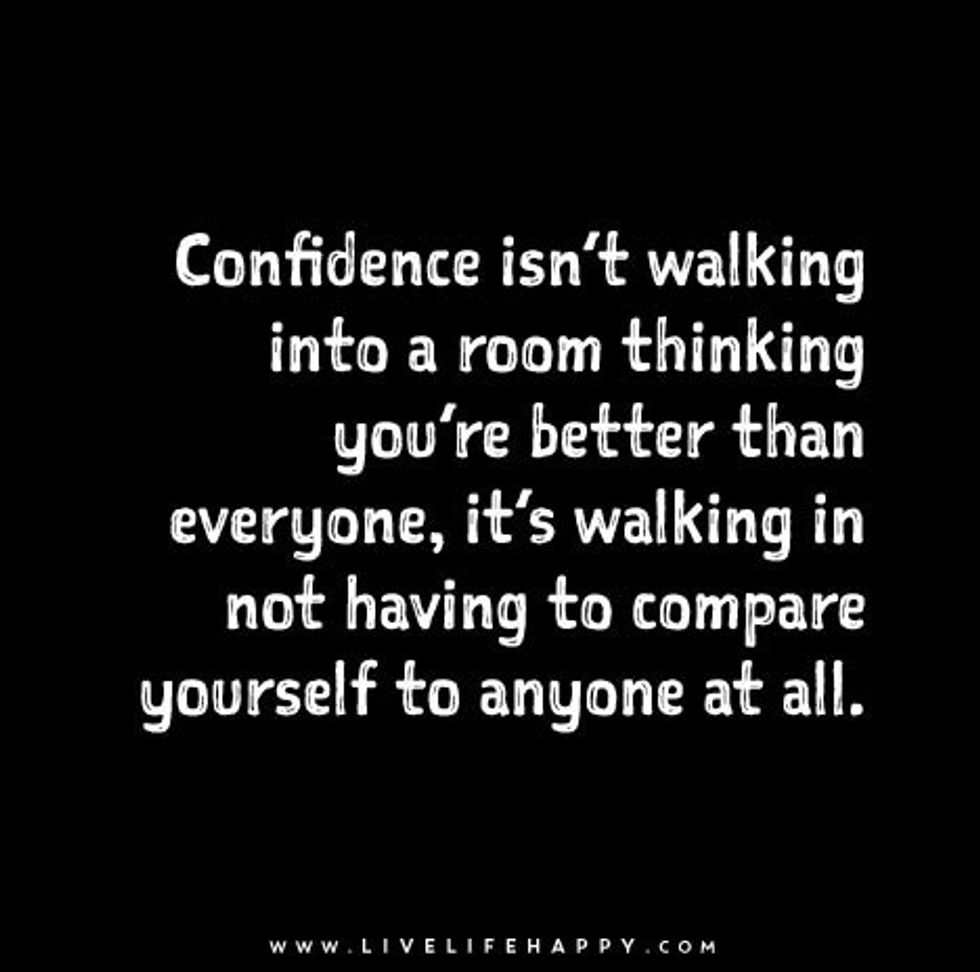A lot of people view confidence as a positive thing, and it’s endorsed almost everywhere— inspirational quotes on the internet, high school graduation speeches, and advice from grandparents. Confidence is encouraged, promoted, and considered a wonderful character trait to have.
Confidence is defined in three different ways, and each of them is equally important. Confidence, according to Google’s compilation of definitions, is “a feeling of self-assurance arising from one's appreciation of one's own abilities or qualities,” “the state of feeling certain about the truth of something,” or “the feeling or belief that one can rely on someone or something.” Being a confident person requires the incorporation of all three.
1. Confidence is a form of courage.
In an ever changing world in which most standards, whether they be of beauty, achievement, morality, etc., are transient, it takes courage to have an honest gauge of oneself and remain self-assured throughout. It takes courage to be authentic and appreciate oneself, especially in a society where it is the norm to talk oneself down in a form of false humility that helps no one and depletes self-esteem. Confidence requires the kind of courage that allows one to stick to their guns and be accepting of his value as a person, regardless of the situations around him.
2. Confidence is also about honesty.
To understand truth, one must first start at a place of self-knowledge and self-appreciation and acceptance. One must know oneself and be confident in what he values to be able to wholeheartedly understand and be certain about his actions, beliefs, and understanding of right and wrong. Only through confidence can one reach a place where he accepts his own behavior and understands his own truth, and has the courage to act on it. Confidence provides the certainty that you understand yourself enough to know what you believe and have the courage to act on it.
3. Confidence is about self-reliance, and being able to ask for help.
Only when secure in oneself can someone be humble enough ask for help, to admit everything is not all okay, and understand it doesn’t reflect on his self-worth or knowledge of the truth. Confidence and humility can absolutely go hand in hand. Confidence doesn't mean thinking you're better, and humility doesn't mean self-deprecation. Believing one can rely have self reliance but that if all else fails it’s okay to get help from a support group is one of the strongest things anyone can do, because it shows that one is comfortable enough in himself to have the humility to do what he needs.
4. Confidence matters.
Confidence matters because it’s okay to be comfortable with yourself, because this acceptance of self and of personal behaviors is the root of happiness, but also of merits actions toward others. Actually, comfort with oneself is the root of compassion, humility, and sure action, and can genuinely make one a better person, toward himself and toward the world, because there it allows one to realize that there is no threat to the self in being open and giving toward others.
However, as much as confidence is promoted, there will always remain people who consider confidence "too much," who will look at you as intimidating and unapproachable, who may consider you a negative influence, people who will dislike the challenge you pose, people who will try to change your behavior or bring you down. You’re going to hear these words again and again, and it takes true confidence to remain true to yourself in situations like that, to treat yourself with respect and stand up for what you believe, to forgive and move on.
On the other hand, though, your confidence will allow you to do what you really love, simply because you love it and because it is important to you, regardless of what others may think. It allows you to realize that you're the only one who has to be okay with you, and this it will give you the courage to act in a way you truly believe is right and that is not dependent on the thoughts of others, reducing perfectionism and anxiety that stems from listening to others than yourself. It will become a source of inspiration to you, to those who admire and love you, and it will help define what it means to truly be you.
So, this is why I propose this expansion of the word “confident.” I’ll admit, interpreted these definitions a little differently than one might normally, and some may consider writing an article like this to be considered overconfident or even egotistical. But I think sometimes a little bit of open interpretation is a healthy sign that regardless of what people think about my confidence, I’m doing alright. *wink.*

























